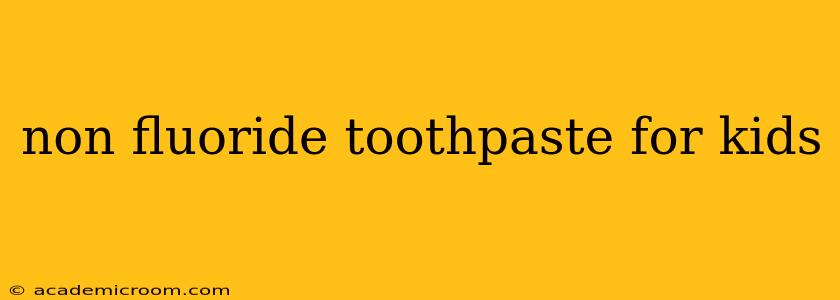Choosing the right toothpaste for your child can feel overwhelming, especially when considering fluoride. While fluoride is widely recognized for its cavity-fighting benefits, some parents opt for non-fluoride toothpaste for their children due to concerns about fluoride ingestion. This comprehensive guide explores the reasons behind this choice, the available options, and crucial considerations for maintaining your child's oral health.
Why Choose Non-Fluoride Toothpaste for Kids?
Many parents choose non-fluoride toothpaste for their children due to concerns about potential fluoride toxicity. While the amount of fluoride in toothpaste is generally considered safe, accidental ingestion, especially by young children, is a concern. Some parents also prefer a more natural approach to oral hygiene, avoiding potentially artificial ingredients found in many fluoridated toothpastes. It's crucial to remember that these are individual choices, and the decision should be made in consultation with a pediatrician or dentist.
What are the Benefits of Non-Fluoride Toothpaste?
The primary benefit parents cite is the avoidance of potential fluoride ingestion. Non-fluoride toothpastes offer a sense of safety for parents concerned about their child's developing system. Many non-fluoride options also contain natural ingredients and are free of artificial sweeteners, flavors, and colors, which can be appealing to parents prioritizing natural products.
What are the Drawbacks of Non-Fluoride Toothpaste?
The main drawback is the lack of fluoride, a crucial mineral for preventing tooth decay. Fluoride strengthens tooth enamel, making teeth more resistant to acid attacks from bacteria and sugars. Without fluoride, children may have a slightly increased risk of developing cavities. This is especially true for children at high risk of cavities due to dietary habits or other factors.
How to Choose the Right Non-Fluoride Toothpaste for Your Child?
Selecting a non-fluoride toothpaste involves careful consideration. Look for toothpastes specifically formulated for children, with a mild flavor and gentle abrasive properties. Check the ingredients list for natural ingredients and avoid those containing harsh chemicals or artificial sweeteners. Always consult your dentist or pediatrician before switching to non-fluoride toothpaste, especially if your child has a history of cavities or is at high risk for developing them.
What is the Best Age to Start Using Non-Fluoride Toothpaste?
Many dentists recommend starting with a rice-grain sized amount of toothpaste (fluoridated or non-fluoridated) once your child's first teeth erupt. The amount can gradually increase to a pea-sized amount as your child grows. The timing of the switch to non-fluoride toothpaste is a personal choice based on your child's age, risk for cavities, and your family's preferences. Always consult with your dentist or pediatrician for personalized advice.
Can Non-Fluoride Toothpaste Effectively Clean Teeth?
Yes, non-fluoride toothpaste can effectively clean teeth. The cleaning action primarily comes from the gentle abrasives in the toothpaste, which help remove plaque and food particles. However, it is important to note that it does not offer the cavity-preventative benefit of fluoride. Therefore, diligent brushing and flossing techniques are essential.
What are the Alternatives to Fluoride Toothpaste for Children?
Besides non-fluoride toothpaste, some parents explore alternative methods for improving oral health. These include dietary changes to limit sugary foods and drinks, regular dental check-ups and professional cleanings, and the use of xylitol products, which can help reduce bacteria growth. Again, it is crucial to discuss these alternatives with a dentist or pediatrician before implementing them.
Are there any potential side effects of using non-fluoride toothpaste?
While generally safe, using non-fluoride toothpaste may increase the risk of cavities if proper oral hygiene isn't maintained. Some children might also be sensitive to certain ingredients in specific non-fluoride toothpastes, leading to minor irritation or allergic reactions. Always monitor your child’s reaction to the toothpaste and consult a healthcare professional if any concerns arise.
Remember, the decision to use non-fluoride toothpaste for your child is a personal one. Thorough communication with your dentist or pediatrician is crucial to making the best choice for your child's oral health. This decision should be based on a holistic assessment of your child's risk factors for cavities, and overall health. Prioritizing consistent and thorough brushing techniques, regardless of the toothpaste used, remains paramount.
